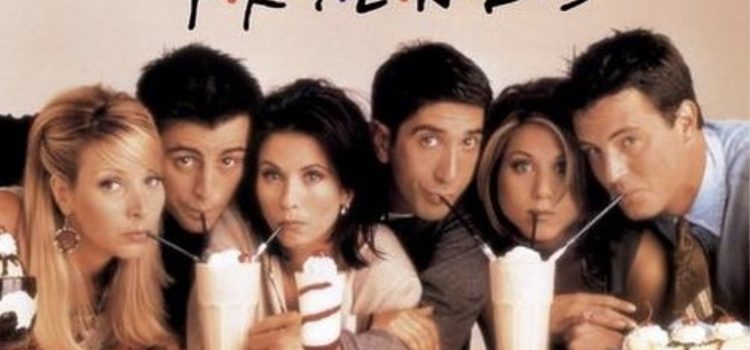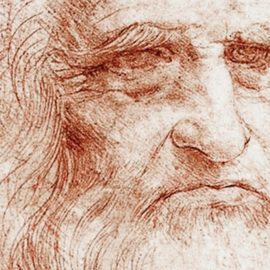

This article is an excerpt from the Shortform book guide to "Friends, Lovers, and the Big Terrible Thing" by Matthew Perry. Shortform has the world's best summaries and analyses of books you should be reading.
Like this article? Sign up for a free trial here.
When did Matthew Perry get cast as Chandler Bing on Friends? How did the show’s success impact Perry’s life?
In 1994, Matthew Perry was cast as Chandler Bing on Friends. But according to his memoir Friends, Lovers, and the Big Terrible Thing, being famous didn’t fix his inner turmoil, and his addictions and struggles with love only got worse.
Keep reading to learn how Matthew Perry’s Chandler role ignited many ups and downs in his life.
Perry’s Big Break
Before being cast as Chandler, Matthew Perry was broke and losing hope of making it in Hollywood at 24. When he realized he was out of money, he took the first job he could find: LAX 2194, a TV show about baggage handlers in the LA airport in the year 2194. It was a poorly received show, and it almost kept him from landing Friends.
(Shortform note: Perry wasn’t the only Friend to almost miss out on the show because of a previous engagement. Jennifer Aniston was in a show for a different network and couldn’t be on two shows at the same time. She got cast as Rachel with the hope that the first show would fail. An executive at NBC, which produced Friends, claims he scheduled popular romantic movies at the same time that Aniston’s first show played on the other network in an effort to kill the competing show. It seems like the strategy worked.)
Shortly after Perry signed onto LAX 2194, Hollywood started buzzing about a new pilot: Friends Like Us (later renamed simply Friends). (Shortform note: Other working titles for the show included Insomnia Café and Six of One.) Everyone wanted to get involved, including Perry, but he had a contract with LAX 2194. All of his actor friends and acquaintances were auditioning for the show, and many of them commented that Chandler was a perfect role for Perry. They even asked him to read Chandler’s lines when they practiced for their own auditions.
His friend, Craig Bierko, was offered the role of Chandler but he rejected it because he wanted to be the star of a show, not part of an ensemble cast. After Craig rejected the role, Perry prayed for the first time in his life. He told God he could do anything to him as long as he made him famous. Soon after, LAX 2194 got canceled and he was free to audition for Friends Like Us. Three weeks after his prayer, he landed the role of Chandler, the last one to get cast.
(Shortform note: The show’s creators were surprised by how difficult it was to cast the role of Chandler. They wanted Perry from the beginning, but since they couldn’t poach him off of LAX 2194, they kept auditioning other actors. The only other actor they liked was Bierko and, after they offered him the role, they learned that Perry had helped him prepare. One of the creators was relieved that Bierko rejected the job because he played the role with anger simmering below the surface which would have made it difficult for audiences to love him.)
Prime Time Success
Friends was a career and culture-defining hit. There were several reasons the show was so successful, including:
The ensemble cast’s chemistry. The show’s producers nurtured that chemistry from the beginning by providing the six stars with plenty of opportunities to get to know each other. For example, the producers sent them to Las Vegas for a weekend before the show’s premiere so they could all enjoy one last weekend of anonymous fun. (Shortform note: The chemistry between the stars was so strong that the audience responded more favorably to a scene where the six of them talked about something than to eventful scenes without all of them present.)
The actors knew the show would be successful if their camaraderie was organic. This kept them from trying to outshine their castmates and encouraged them to negotiate their salaries together—led by David Schwimmer—and make sure they all made the same from each episode. (Shortform note: Their camaraderie made it an early positive example of gender equality. Since all six decided to negotiate their salaries together, it ensured the three women were paid equally to their male counterparts, something that actresses still struggle with today.)
The collaborative nature of the set. Anyone could get their joke included in an episode if it was funny. Perry and David Schwimmer (who played Ross) contributed the most jokes, for their own characters and for their castmates.
(Shortform note: Perry credits Courtney Cox (who played Monica) with setting a collaborative tone among the stars. She was the most famous of the six, but she stressed the fact that they were an ensemble. Elsewhere, Lisa Kudrow (who played Phoebe) shared that Cox asked her costars to give her notes, breaking an unspoken rule among actors and opening the door to collaboration.)
The writers also fed off the actors’ ideas and lives. Early on, they took each star to lunch to get to know them and incorporate some of their real-life traits into their characters. This helped emphasize the similarities between Perry and his character, such as a fear of intimacy, an addiction to cigarettes, and the use of humor to hide underlying emotional pain.
(Shortform note: The writers also incorporated feedback from the actors. Matt LeBlanc, who played Joey, worried that his part would get cut if the show did a romantic storyline about him and one of the female characters and it ended up not working out. So, he asked that his character be a protective figure of the three women and that he never get involved with them romantically.)
An Addiction and Recovery Rollercoaster
Getting cast in Friends was a turning point in Perry’s life. On the one hand, he believes it saved his life. He staved off the worst of his addiction (for example, avoiding heroin because he knew it would be impossible to quit) and tried to stay healthy because he loved his job and he knew how lucky he was to have it. On the other hand, Perry feels that God upheld his end of the bargain—made him famous—but also made sure to collect Matthew’s end and put him through challenges that almost broke him.
During Friends’s 10-year run (1994-2004), Perry went to rehab several times. The first time was in 1997, but he went back to drinking soon after. In 2000, he was diagnosed with pancreatitis as a result of heavy drinking. He received treatment but he went back to Vicodin and alcohol when he recovered.
Perry tried and failed to keep his drinking from affecting his job. He says he was never drunk on set, but he was frequently hungover, and his costars became aware of his problem. At one point, Jennifer Aniston (who played Rachel in Friends) told him they could smell the alcohol on him and they were worried. The viewers also had some insight into his health thanks to his noticeable weight fluctuations. He says that the seasons where he’s underweight are the ones where he was addicted to pills, and the seasons where he’s overweight are the ones where he’s drinking too much.
When he realized the cast and crew of Friends were onto him, he started working on a movie, Serving Sara, to escape the show’s set. His performance in the movie was so bad that he later had to dub over his lines because he had been slurring them. He also had to pay the production for damages because they needed to stop filming so he could go to rehab.
At one point during the filming of Serving Sara, his then-girlfriend told him he needed help. She took him to a detox center where he first read the big book of Alcoholics Anonymous. Reading the book helped him understand he was being narcissistic and selfish. He tried going back to work on the set of Friends after three weeks, but his father intervened. He called the producers and threatened to pull Matthew off the show if they insisted on having him back before he was well.
After a month in the detox center, he was sent to a long-term care facility because he still needed support. He ended up staying there for three months, but he simultaneously returned to work. In fact, he was living at the center when the highest point of his character’s story arc aired: the wedding of Chandler and Monica.
After that stay in the treatment center, he was sober for two years (2001-2003), which he believes were two of the best years of his life. During that time, he was nominated for an Emmy and he found purpose in helping other people get sober. But Perry’s struggle with addiction wasn’t over. In fact, it would get so intense that he would even have a spiritual experience.
In 2003, a relationship he was in ended badly and he went back to pills. At one point, he was unable to sleep and took eight Xanax pills at once. Standing in his kitchen, he prayed to God for help because he knew that going from eight pills to zero in a matter of hours was dangerous and might even kill him. After praying, he saw a golden light and felt a warmth around him that he attributed to God. After the light and warmth were gone, he cried with relief because he felt he had been in the presence of God.
Struggles in Relationships
The breakup in 2003 that led him back to pills was only one of Perry’s many failed romances with women during this time. He was in several relationships, but he always ended them. He feared that they would get too close, see who he really was, and break up with him, so—in all but one of his relationships—he broke up with them before they had the chance to hurt him.
While he was sober from 2001-2003, he was mostly single. He broke up with the woman who took him to rehab because he wanted to enjoy his sobriety. He proceeded to have a string of casual relationships that he enjoyed but now considers to have been a mistake—he wishes he had invested that time in looking for a more meaningful relationship.
(Shortform note: Perry’s approach to relationships suggests that he might be an avoidant attacher. In Attached, Amir Levine and Rachel Heller explain that a person with an avoidant attachment style doesn’t possess a compelling desire to achieve closeness with a romantic partner. When the partnership gets too close, they feel suffocated.)
The End of an Era
In 2004, Friends came to a close. When the show ended, Perry and his castmates were ready to say goodbye to their characters. Still, the finale was emotional and the entire cast and crew—except Perry—were in tears that last day. He claims he didn’t feel anything, probably because he was taking Buprenorphine, an opioid that helps people get over addictions to other opioids but made him feel numb. However, he realized the show’s ending was momentous and he asked the producers to have the honor of delivering the last line.
(Shortform note: Perry’s emotional numbness may have prevented him from being part of a special moment with his co-stars after the end of the show. In the memoir, he describes taking a walk around the set, then sitting in his car for a long time before deciding to go home. But in interviews, Jennifer Aniston shared that a few of the stars stayed on set drinking champagne and watching the sun rise, which she described as a wonderful moment.)
After the show ended, he continued to feel the impact of Friends in his life. He struggled with being typecast and with people seeing him as Chandler in every role he played. Still, he acknowledges that he is lucky to be typecast into a role that was part of such an impactful show that made him so successful and wealthy.
(Shortform note: The impact of Friends lives on, not just for Perry. In recent years, thanks to streaming services, new generations have discovered the show and renewed its following. One of the show’s creators argues that this is because it’s the equivalent of comfort food in television: easy to love and not demanding of its viewers.)

———End of Preview———
Like what you just read? Read the rest of the world's best book summary and analysis of Matthew Perry's "Friends, Lovers, and the Big Terrible Thing" at Shortform.
Here's what you'll find in our full Friends, Lovers, and the Big Terrible Thing summary:
- Actor Matthew Perry's autobiography about health, loneliness, and addiction
- Words of hope for those who are currently struggling with substance abuse
- A look into Perry's childhood, his time on Friends, and his life after Friends






